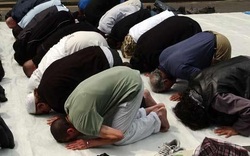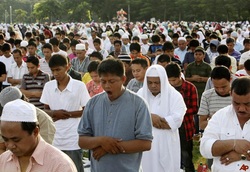By Anjeanette Manuel
 Photo Courtesy of blogs.telegraph.co.uk
Photo Courtesy of blogs.telegraph.co.uk 23% of the world’s population consists of Muslim and approximately 4.2 million are Filipinos. This year, July is considered as a holy month for them yet a lot of people are clueless as to what it signifies among the Islamic community.
The term “ramadan” comes from an Arabic word meaning scorching as this event falls on a hot season and on the ninth month of the Islamic calendar. According to Islamic tradition, the month of Ramadan is when Allah (God) revealed the first verses of Qur’an, the holy book to Prophet Muhammad (PBUH).
During this month, Muslims around the world undergo a complete fasting or abstaining from food, water or any physical needs from dawn to sunset. This is to purify their soul, establish a complete attention on Allah and practice self-sacrifice. It is also a time wherein they re-evaluate their spiritual lives in accordance with the Islamic teachings.
Before sunrise, Muslims have their pre-dawn meal that will carry them on for the day and at sunset, friends and families gather for Iftar or the meal that breaks the fast. The fasting ritual is known as the Sawm, one of the five pillars of Islam that requires a Muslim to restrain every part of one’s physical body.
The mouth, for example, is restrained from idle talk and gossip, while the ears are restrained from listening to obscenities. In this way, a Muslim engages his or her entire body in the physical observance of the Ramadan fast and by stripping down one’s material desires, one can focus on the worship and service to Allah.
Exceptions from fasting are given to pregnant or breastfeeding mothers, person with serious health issues and children that still haven’t undergone puberty.
In a Muslim country like United Arab Emirates or generally, during Ramadan non Muslims are encourage to refrain from eating or chewing in public to show respect. Eating and entertainment establishments are closed and office hours are lessened.
In addition to fasting, Ramadan is also a time to re-evaluate one’s action, to mend troubled relationships, a time to forgive and give charity to the less fortunate ( second of the five pillars of Islam).
The end of the month of Ramadan is marked with the religious festival of Eid al-Fitr, which literally means the “Festival of Breaking the Fast.” Muslims around the world celebrate this occasion with families, friends and loved ones. Joyous feasts, elegant clothes and Arabic sweets can normally be seen during this celebration.
Before sunrise, Muslims have their pre-dawn meal that will carry them on for the day and at sunset, friends and families gather for Iftar or the meal that breaks the fast. The fasting ritual is known as the Sawm, one of the five pillars of Islam that requires a Muslim to restrain every part of one’s physical body.
The mouth, for example, is restrained from idle talk and gossip, while the ears are restrained from listening to obscenities. In this way, a Muslim engages his or her entire body in the physical observance of the Ramadan fast and by stripping down one’s material desires, one can focus on the worship and service to Allah.
Exceptions from fasting are given to pregnant or breastfeeding mothers, person with serious health issues and children that still haven’t undergone puberty.
In a Muslim country like United Arab Emirates or generally, during Ramadan non Muslims are encourage to refrain from eating or chewing in public to show respect. Eating and entertainment establishments are closed and office hours are lessened.
In addition to fasting, Ramadan is also a time to re-evaluate one’s action, to mend troubled relationships, a time to forgive and give charity to the less fortunate ( second of the five pillars of Islam).
The end of the month of Ramadan is marked with the religious festival of Eid al-Fitr, which literally means the “Festival of Breaking the Fast.” Muslims around the world celebrate this occasion with families, friends and loved ones. Joyous feasts, elegant clothes and Arabic sweets can normally be seen during this celebration.
 Photo Courtesy of newshopper.sulekha.com
Photo Courtesy of newshopper.sulekha.com Eid al-Fitr in Philippines is marked by the Philippine government as a regular holiday in deference to the Filipino-Muslim community and to promote a harmonious relationship among the religions in the country.
Eid al-Fitr this year will begin on August 7 and ends on the 8th (dates may vary).
#
